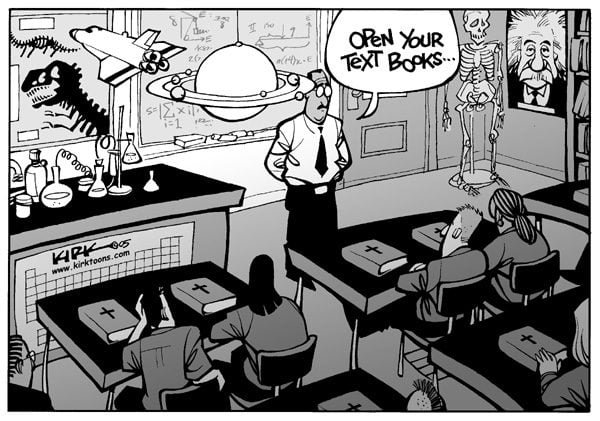
Guest post by ObstacleChick
Looking back on my 1988 valedictory address at an Evangelical Christian school, I would like to put my remarks into some context. Some of you may have read parts of my story in other posts, but the quick summary is that my mom and I left my abusive dad in Knoxville, Tennessee when I was three years old to live with my grandparents outside Nashville, Tennessee. My mom held some relatively progressive views on racial and gender equality, and she encouraged me to read and to ask questions. She even admitted that a lot of things in the Bible might be allegory instead of historically accurate. Sometime during my adolescence, I realized she had turned thoroughly Christian Fundamentalist, forbidding movies such as “Star Wars” which we had previously enjoyed together.
Additionally, due to rumors that students in my public school district were to be sent to a predominantly African American school district, my mom and grandparents decided to send me to an Evangelical Christian school for grades 5-12. This school taught everything from a “Christ-centered Biblical view” — which means we learned lame apologetics for Young Earth Creationism, were required to take Bible classes, attend chapel, and were forced to abide by a gender-specific dress code. I hated that school.
My grandparents were very active in the Southern Baptist church in our rural community. Grandma became a neophyte culture warrior, and Grandpa was a deacon who quietly helped anyone in the community (whether a member of our church or not) who he heard was in need. He was a master of connecting those in need with those who were willing to help. Grandpa also taught me that my education came first and that I should NEVER EVER be dependent on a man financially. His biggest dream was for me to attend Vanderbilt University in Nashville. It became my biggest dream, too, and I determined to excel academically to make it happen.
In my endeavor to achieve academic excellence, I came to look down upon my peers as inferiors. In my estimation, popular culture was cheap, anti-intellectual, and as useless to one’s intellectual improvement as cotton candy is to one’s nutrition. However, I also grew to look down upon the pastors and leaders of our church as teaching anti-intellectual doctrine. I considered the (male) teachers at our school to be only slightly better. My viewpoint was exacerbated by my exposure to working with Ph.D. Biochemists at Vanderbilt University when I was 16 years old. My mom worked in the Biochemistry department as an administrative assistant, and due to our lack of automobiles, I had to work wherever was convenient for my family in terms of transportation. At 16 years old, I got a job as a dishwasher and lab assistant at the university. I was able to meet highly educated people from all over the world. I knew these were the people I wanted to be like, not the Christian Fundamentalists of my church and school world. However, I knew that the Christians among them were not Real Christians®, and some of the scientists weren’t Christians at all. It became difficult for me to reconcile the Fundamentalist teachings of church and school that these people were damned to an eternity in Hell with the reality that they were kind, intelligent, socially active human beings. These people became my mentors and my friends as I worked with them for eight years (two years before college, during college, and for two years afterward).
As a high school student, I did not have many friends. Students attending the Christian school came from far and wide, so some of my classmates lived a 30-45-minute drive away and I did not always have access to a car. I was not allowed to participate in activities outside school (except for piano lessons to which my stepfather drove me each week), so my goal was to excel in everything I was allowed to do. My competitive nature, coupled with my determination to gain admittance to Vanderbilt, fueled my path to academic and musical dominance. I refer to it as “dominance” because my goal was not merely to learn the material, it was to master the material and to score the highest grades. It wasn’t uncommon for me to “blow the curve” on tests, where I would score 100 and the next highest score might be 85 or even in the 70s. I was known as the “smartest” student in school, and I relished that title.
However, I was a depressed and angry teenager. I felt utterly trapped in a school where everything must fit within a “Christ-centered Biblical worldview.” For Bible class, it was easy for me to regurgitate the material. While there were gaping holes in our education about history (for example, we never learned about Martin Luther King, Jr. and the civil rights movement), we weren’t required to recount history in a particularly Christian manner — just the facts were required (the facts as they were presented, that is). And looking back, I believe our English teacher was struggling with the confines of Fundamentalist Christianity as he only preached in chapel the minimum required number of times, and he walked a fine line with the literature he selected for his classes. (Years later I heard that he and his wife divorced, and he took a job as a truck driver, traveling the country, and no one seems to be able to find him.) In most classes, there would be discussions of some sort about God, the dangers of secular humanism, the ridiculousness of evolution, and the erosion of society due to people “turning away from God.” And let’s not forget that every chapel service was a reminder that we were all filthy sinners in need of the saving grace of Jesus in order to escape eternity in hell.
I resented that my whole life was supposed to revolve around giving glory to God. “Study to shew thyself approved unto God, a workman who needeth not to be ashamed, rightly dividing the Word of Truth” (2 Timothy 2:15 KJV). This was one of the mantras of the school. The other was this: “Let no man despise thy youth; but be thou an example of the believers, in word, in conversation, in charity, in spirit, in faith, in purity.” (1 Timothy 4:12 KJV). As a student, I worked hard for my success and thought I deserved recognition for it. Maybe God had given me intelligence, but I had worked hard to use it. I hated hearing all the “God talk” where people were thanking God for this or that in which humans had more of a hand than an invisible deity seemed to. These praises seemed obsequious to me, as from someone seeking favor from a deity they feared.
Students in our school were encouraged to attend Evangelical Christian universities. The administration and faculty wanted as many students to follow a “Christ-centered Biblical” path as possible, both to promote this as a benefit to prospective parents and because they felt it was the right thing to do. Many of my classmates were personally steered toward these types of universities. I was the only one who was not steered in that direction. It was also a benefit to be able to promote that not only do most students attend Christian universities and become pastors or teachers, but the academics are so sound that they can also be admitted to nationally-ranked universities.
When it was time for me to write my valedictory address, I had a lot of different emotions. I was ecstatic to finally be free of the shackles of the “Christ-centered Biblical” education and able to pursue secular education. Additionally, I still looked down on the majority of my peers who were secretly (or not so secretly) listening to rock music and attending parties — to which I was not invited — instead of forging a path for their future (in my opinion). Furthermore, I considered graduation a celebration of my hard work and accomplishments, and I wanted to make sure that was evident to all in attendance. Neither did I want to sully my accomplishments with “giving glory to God.” I was a pompous jerk, excited about having the freedom to escape Evangelical education for the opportunities available in “the world.” While I did have some trepidation about navigating “the world” — partly because I was more sheltered than my public-school-attending peers and partly because I was still afraid of what God might do to me if I strayed too far from the fold — I was glad that no one tried to stand in the way of my pursuit.
My valedictory address reflects my contempt for my peers (hence no congratulatory message to my peers) as intellectual and cultural inferiors. It reflects my arrogance in my own intelligence and willingness to read what I considered to be intellectual books outside those assigned in class. It also reflects indoctrination regarding the “evils” of rock music, premarital sex, drug & alcohol use, and divorce. However, it also reflects that I did not refer to salvation due to a return to Christian values or praying to God or any other Christian trope. I didn’t let the door hit me on my backside on the way out of Christian school.
At the university, I was active in the Baptist Student Union during my first two years and attended church services at a large Southern Baptist Church near campus. However, I took courses that opened my eyes to the false claims of inerrancy and literalism of the Bible, which led me to question much that I had learned in religious circles about human behaviors, and overwhelming, incontrovertible evidence contrary to Young Earth Creationism. I befriended people from different religions, people who were LBGTQ — who were cut off from their religious families for just being who they were — and people who were from different cultural, ethnic, and economic backgrounds. Gradually I lost some of the intense fear of the Evangelical Christian God and was able to live my life freely. Again, I didn’t let the door hit me on my backside on the way out of Fundamentalist Christianity.



